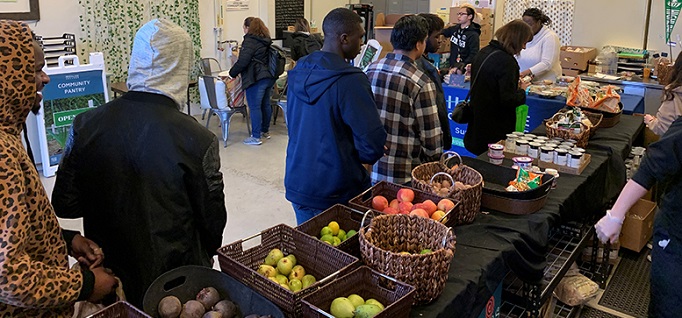Finding hope in college
By Cesar Canizales
March 18, 2020
A United Way program supports community college students and their educational goals.
Paula, a second-year student at Highline College in Des Moines, Washington, doesn’t have much time for rest or sleep in general, but she is determined to finish her education. She has three jobs and is taking 13 credits at the school, but she’s not deterred.
“I work overnights. I work on the weekends, and I go to church on Sundays,” Paula said. “My time to rest is when my son brings me here because I don’t have a car. I would say I get three to five hours of sleep a day.”
What gives her hope and encouragement to finish her education, she said, is United Way of King County’s Bridge to Finish. The program helps low-income students graduate by providing much-needed services like emergency financial grants, housing assistance, access to food pantries and financial education. It also connects students to public benefits, such as SNAP, the U.S. Department of Agriculture program that provides nutrition benefits to low-income people.
Offering an extra hand
United Way piloted the program in 2016 through “Benefits Hub” sites at four campuses and later expanded it to serve eight community colleges and the University of Washington at Bothell. The program is based on the knowledge that low-income and students of color face unique challenges that often keep them from earning a college degree or credential — tools that can help them break the cycle of poverty.
Those challenges include homelessness and hunger. According to the Hope Center for College, Community, and Justice, 51 percent of students at Washington state community and technical colleges were housing insecure, 41 percent were food insecure and 19 percent were homeless.
Bridge to Finish aims to reduce those barriers. In the 2018-2019 school year, Benefits Hubs across all campuses assisted 4,200 students — more than 60 percent of them were students of color.
On average, those students accessed Bridge to Finish services three times over the course of the year, increasing their likelihood of success. Students who received services persisted at a 9 percent higher rate than other students, and students of color persisted at a 12 percent higher rate.
Without Bridge to Finish, “I would not come to school. I wouldn’t be able to come to school anymore,” said Paula, whose full name is withheld per request.
Paula, who was homeless for two years before she went to Highline, said that even though she has three part-time jobs, her hours vary, so she often doesn’t have enough income.
“It’s even the basic needs sometimes,” Paula said. “We’re in a house, so what do you pay first? The rent? How do you manage the money?”
While she received some financial help from Bridge to Finish to pay for her rent, that’s not all that is keeping her afloat. She explained that before she went to see the coaches at the Benefits Hub, she was “broken,” but the staff there were ready to listen and assist her with multiple resources.
“They give you the strength to go back to class,” she said. “Now I have hope — I feel that that’s something we lose — hope.”
Aiming to help others
Paula said she’s planning to change her major to human services, so she can give back to the community. After she gets her degree, she hopes to go back to work at Highline because she loves the diversity at that school.
“I feel like I have a lot to give because of what I’ve gone through,” Paula said. “Because I know the struggle — some people are not 100 percent prepared to come to college. They don’t know the resources. They’re scared to ask. So, that’s why I want to help out.”
Paula added that she goes to the college’s food pantry, which is overseen by Benefits Hub staff, at least twice a week to make ends meet for her and her husband.
“Sometimes there’s not enough money,” she said. “Sometimes there’s so much to catch up to what you already owe — how do you pay the bills? If I didn’t have the Hub to help me with the rent, I might be homeless.”
Paula said she’s not sure what she would do without the help she gets from Bridge to Finish.
“I would not come to school. I wouldn’t be able to come to school anymore,” she said.
This article originally appeared in CC Daily.



